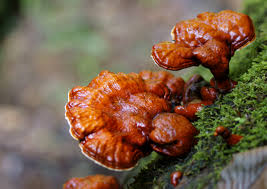Maybe Alice in Wonderland was on to something, nibbling on a mushroom to make herself shrink. New research has shown that a liquid extract made from a mushroom used in traditional Asian medicine for more than 2,000 years protects against weight gain and reverses obesity-related inflammation and metabolic dysfunction in overfed mice.
The mushroom, Ganoderma lucidum (known in China as lingzhi, and in Japan as reishi or mannentake), appears to work by correcting an unhealthy mix of microorganisms that colonized the guts of mice made obese by a diet of high-fat chow.
Published Tuesday in the journal Nature Communications, the findings of researchers in Taiwan lend credence to the woody mushroom’s ancient reputation as a promoter of longevity and digestive health. But they also illuminate the powerful role that gut microbes appear to play in obesity and several of the ills associated with it.
Scientists remain uncertain as to which comes first – obesity or a community of gut microbes that is out of whack. But researchers are growing increasingly confident that prebiotics or probiotics – food or supplements that jump-start the growth of protective bacteria in the gut – may help protect against the health effects of overconsumption.
The latest research offers further confirmation of a relatively new theory among researchers: that the insulin resistance and high levels of systemic inflammation often seen in the obese stem in part from a decline in populations of gut bacteria that line the intestines.
Like an army guarding a permeable border, those good bacteria prevent the seepage of toxins produced by other gut bacteria through the gut wall. In mice fed a high-fat diet, those who also got a daily dose of Ganoderma lucidum extract for two months retained strong populations of border-guarding bacteria and showed low levels of inflammation in the bloodstream. The obese mice who didn’t get the mushroom elixir developed insulin resistance and high levels of inflammation.
Those were among many differences between mice fed a high-fat diet that got the mushroom extract and those that did not. After two months, mice who got only high-fat chow had become obese, with fatty livers and large accumulations of visceral and subcutaneous fat.

